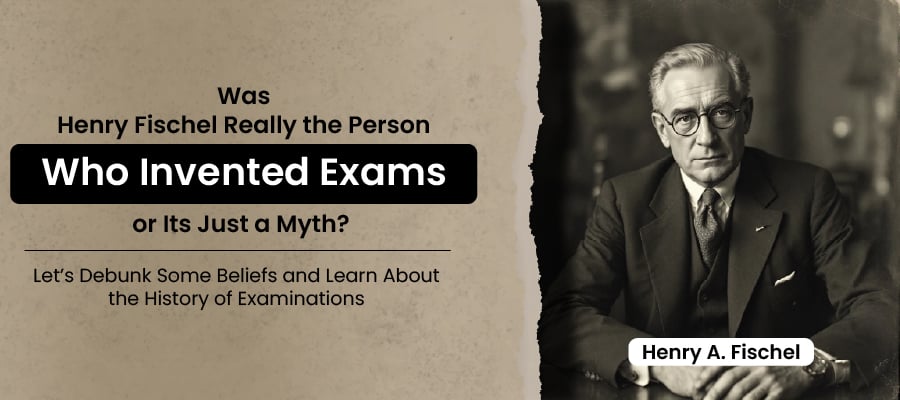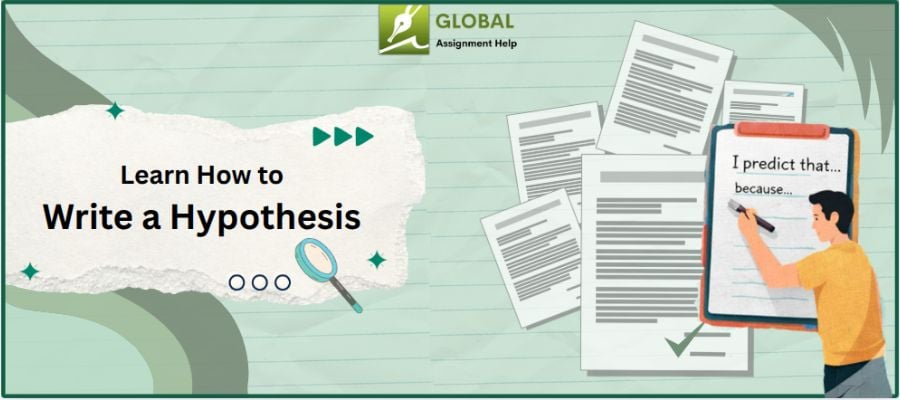You, like many other students, have, at some point in life, must have wondered who invented exams and why. What were the causes that led to their invention? Lastly, what is its current status? All these questions are vital, and as you will read the blog, you will get the answers to all these queries.
Moreover, you will also learn why exams became the standard to check your knowledge and to discover your skills. Even though most of you hate this particular discovery, learning about its origin can be fun, and you will also see its evolution with time. So, let's begin and talk about the person who was responsible for inventing exams.
Who Invented Exams? | The Founder
Do you know when the exam first start? Although the concept of exams can be traced back to ancient China, the person responsible for introducing it to the world was Henry Fischel. However, there is a catch! Some sources credit Henry Fischel, an American businessman and philanthropist who lived during the 19th century with the invention of exams.
On the other hand, some other sources give credit to Henry A. Fischel, a teacher of Near Eastern languages and cultures at Indiana University. Let us know more about who is the founder of exam through the lens of his life history and contributions.

Bibliography
- Henry A. Fischel was born on November 20th, 1913, in Bonn, Germany.
- His real name was Heinz Albert Fischel.
- He had several brothers and a sister, and they ran a successful show business.
- He studied at the University of Bonn for a year and is also said to have a deep appreciation for German culture, as evidenced by his fondness for Beethoven.
- He studied Roman law, philosophy and law and later developed an interest in religious studies. Moreover, he finished his master's in Jewish studies in five years.
- He later moved to Berlin and studied Judaism at Hochschule für Wissenschaft des Judentums.
- After completing his PhD in 1945, he took up a teaching job at the University of Alabama.
- In 1958, he took a teaching gig in Brandeis, and later, in 1961, he joined Indiana University as a professor
Contribution
- He was renowned for setting up the Division of Religious Studies and the Jewish Studies Program at Indiana University.
- He also imparted education to students on love, law, civilization and Jewish culture.
- Also Conducted detailed research about the link between Greek and Jewish literature and culture.
- Lastly, he also introduced formal examination as a way to assess a student's knowledge and academic skills. However, there is no official confirmation as to whether he was the person who invented school tests.
So, this is all about the person who invented exams. However, if you need help with your exams, rather than cursing the dead, come seek online exam help from our experts.
The Evolution of Exams Through the Ages
In this section, you will see the evolution stages that exams have gone through and what they look like today. So, let us begin!
History of Examination
Where did exams originate? The concept of Exam can be dated back to ancient China. The national evaluation, which was formally known as the imperial examination, was carried out by the country's government to select candidates for government positions. It is also known as Keju's History of Examination. The test was first established by the Sui dynasty in AD 605. However, later, China discarded the exam-based appointment system in 1905.
As for the history of examination of UK, England also introduced the idea of exams on the heels of China to test whether candidates were qualified to work in the Majesty's Civil Service. Later, exams gained traction in academics as a means to evaluate scholar's knowledge.
Eventually, many nations accepted this method in many different forms. Even today, the way schools test students differs from each other. However, Henry introduced the basic fundamentals of tests in education. Hence, he is considered as the founder.
So this is what the ancient education system looks like. If you want to know more about the origin of exams, you can contact our experts at Global Assignment Help.
Types of Examinations
In the previous section, you saw who took the exams. Now, let us move forward and see how the present picture of exams looks. There are many kinds of exams that have come into existence, and we will see them in detail under this point. So, without any further ado, let us see these kinds.
- Open-book exams
- Take-home exams
- Oral exams
- Practical exams
- Essay exams
- Short answer exams
- MCQ's
- Case study exams
The structure, mode and difficulty level of these exams vary on the basis of specifications, subjects, and policies of the organizations or governing bodies. Although these exams are pen-based after the invention and advancement of technology, computer-based exams are also being conducted.
Hire experts!Exam System: A Necessary Evil or Outdated Traditions?
In the above-mentioned sections, you have learned who invented exams, their history and their different types. Now, we will answer the million-dollar question: Whether the exam system is a necessary evil or an outdated tradition?
Well, for students like you, examinations can be a source of anxiety and frustration. However, the person who created the exam did not want you to fall into depression; it was build with the sole purpose of putting a responsibility on you to understand the concepts better and put them forward in a transparent manner. Mentioned below are some of the benefits of conducting examinations for students studying in schools, colleges, and universities.
- Promote competitiveness among students.
- Force the students to work a little extra.
- Improve the learning and other skills.
- With the intention of attaining scholarships.
- Enhance knowledge and memory.
- Make the students feel more confident.
- Assist students in managing their time efficiently.
With all these benefits in mind, different levels of examination were brought into existence.
Significant Differences Between Exams vs. Tests vs. Homework
This section will shed light on some major differences between exams vs. tests vs. homework. It will help you to understand the difference between them and will bring more clarity. So, let us see what these distinctions are:
|
Tests |
Examinations |
|
They are simplified versions of exams. |
They are more complicated and extensive. |
|
They recur throughout the year to evaluate your progress in class. |
They are usually held at the end of the year, and you receive a grade that will decide your progression to the next stage. |
|
It has an informal format. |
It is more of a formal affair. |
|
Homework |
Exams |
|
Who invented homework? Horace Mann. |
Who invented exams?- Henry A. Fischel |
|
Homework is given to you frequently, sometimes on a daily basis, and you have to submit it the next day. |
Exams are held at the end of the year but not frequently. |
|
Its purpose is so you can understand the concepts taught in the class. |
Its purpose is to test your knowledge and other skills that you have learned in class. |
|
These act as a preparatory ground for exams. |
They help you decide what grades you receive and your progress to another stage. |
So, these are some of the significant differences between the three counterparts. They are mutually exclusive and dependent on each other. If you want to know more about them, then you can seek our expert's help.
Final Words
So, this is all about who invented exams. All the information given above will help you to understand the history and importance of exams. Moreover, you also understand the differences between exams, homework, and tests. If you want more information regarding this topic, you can seek assignment help UK.
The experts at our service will provide you with the necessary information, which will help you understand the concepts of exams. Moreover, they will also adhere to the academic standards and uphold your integrity. So, what are you waiting for? Contact us now and learn more interesting facts about who invented GCSE exams.
Frequently Asked Questions
Q1.What Is an Examination?
An examination is a formal assessment, which is either written or oral, formulated to examine a student's knowledge, skills, or capabilities in a specific subject or area. To put it plainly, it serves as a means to gauge understanding, size up progress and, on the basis of it, award certificates.
Q2. When Was the First Formal Examination Held?
The concept of examinations has its roots in as far as the ancient civilizations, but China holds the credit for implementing the first formal, nationwide examination system. This system is also known as the Imperial examination or Keju. It was established during the Sui Dynasty in 605 AD.
Q3. Who Invented Exams In the UK?
Although you can find the origin of exams as far behind as the ancient civilization, Henry Fischel, an American professor and educationalist, is the person who holds the title for introducing exams in the modern world. However, oral exams were more popular in Europe in the 19th century, but with time, written assessment took precedence.
Q4. Name the Toughest Exam In the World.
The exam that graces the title of being the toughest in the world is the Gaokao, which is held in China. You need a lot of preparation as it lasts for several hours. Moreover, it is so complex and stressful that only a handful of people from top universities can clarify it.
Free Tools

Easy to Use Paraphrasing Tool to Simplify Complex Academic Writing
Check Now
Get Structured Outline by Professionals for Your Dissertation
Check Now
Effortlessly manage citations and references with our smart referencing tool
Check NowPrice Calculator
- Plagiarism
- Pricing
- Order Now
- Call Back
- Live Chat

Limited Time Offer
Exclusive Library Membership + Free 300$ Wallet Balance

Get $300 Now
Update your Number





























Thank you for submitting your comment on this blog. It is under approval. We will carefully review your submission and post it on the website.